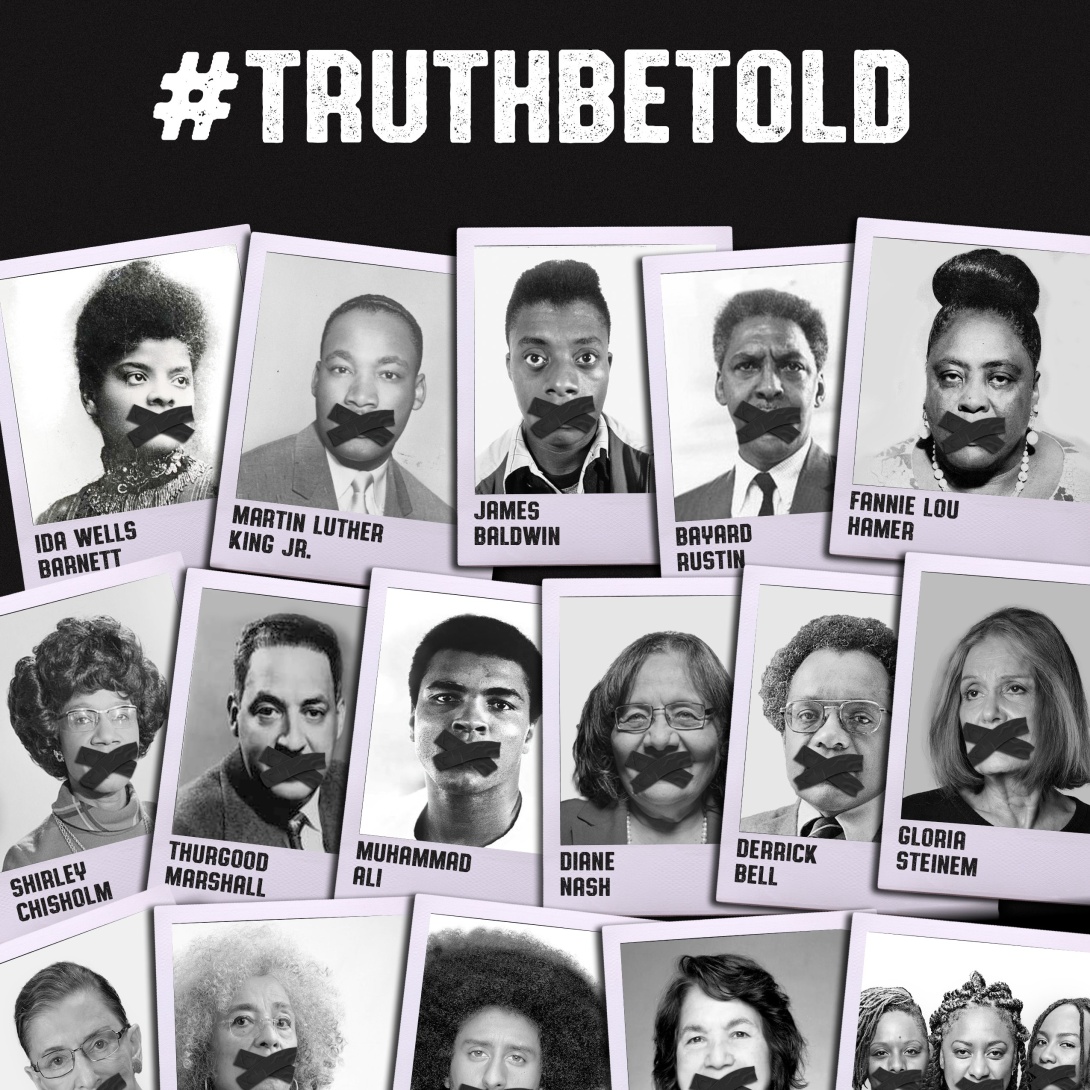The campaign to overturn Trump's truth-denying equity gag order

The African American Policy Forum launched the #TruthBeTold campaign to reverse Trump's equity gag order, part of a long tradition of silencing those who speak out against racism and sexism in the U.S. (Photo via the AAPF Twitter page.)
Nikole Hannah-Jones' Pulitzer Prize-winning The 1619 Project, published last year by The New York Times Magazine, was an effort to reframe U.S. history by centering the consequences of slavery and the contributions of Black Americans. It was timed for the 400th anniversary of the arrival of the first enslaved Africans in the Virginia colony.
"In August 1619, just 12 years after the English settled Jamestown, Va., one year before the Puritans landed at Plymouth Rock and some 157 years before the English colonists even decided they wanted to form their own country, the Jamestown colonists bought 20 to 30 enslaved Africans from English pirates," Hannah-Jones wrote. These men and women were the first of the 12.5 million Africans who would be kidnapped from their homes and forced into slavery in America. Another 2 million would not survive the journey through the Middle Passage.
By 1776, as the nation was being born, Thomas Jefferson was inscribing into the Declaration of Independence that "all men are created equal" — even though many of the founding fathers owned enslaved people or condoned the institution of slavery. In fact, as Hannah-Jones notes, 10 of the nation's first 12 presidents were enslavers.
These are inconvenient truths, but truths nonetheless.
But in September, President Trump signed an executive order that attempts to stifle the telling of this history. Executive Order 13950 forbids so-called "race or sex stereotyping or scapegoating," which it defines as "ascribing character traits, values, moral and ethical codes, privileges, status or beliefs to an entire race or sex, or to individuals because of their race or sex." Called the "equity gag order" by opponents, it effectively bars federal employees, contractors, and grant recipients from talking at work about issues like white privilege, systemic racism, and implicit bias.
"Critical race theory, The 1619 Project, and the crusade against American history is toxic propaganda, ideological poison that, if not removed, will dissolve the civic bonds that tie us together," Trump said at a White House conference just five days before signing the order. "It will destroy our country."
In response to the order, the African American Policy Forum (AAPF) — a social justice think tank led by Black feminist and legal scholar Kimberlé Crenshaw — has launched the #TruthBeTold Campaign. The effort "aims to galvanize support for the immediate recession of the Equity Gag Order, raise awareness of its widespread harms, and provide organizations and institutions with the resources to challenge efforts to suppress honest conversation on our nation's history."
As part of the campaign, the AAPF released a report that calls the order "the latest iteration of a long history of state and federal governments using their coercive powers to suppress speech that challenges injustice and inequity." It places Trump's targeting of The 1619 Project in the context of how the press — particularly the Black press — has historically been attacked for telling the truth about race and racism in America.
Before the Civil War, for example, abolitionist newspapers were labeled as seditious, with laws in states including Georgia, Mississippi, South Carolina, and Virginia banning such publications. During the 1898 Wilmington Massacre in North Carolina, when white supremacists carried out the only successful coup d'état in the U.S. by forcibly removing the city's multiracial fusionist government from office and killing dozens of Black people, they also burned down the offices of The Wilmington Daily Record — at the time one of the state's only Black newspapers.
Then in 1918, as the U.S. government began surveilling Black leaders in a plot to frame them for sedition, the agents with the Department of Justice ransacked the editorial office of The Messenger, which billed itself as the "only radical Negro magazine in America" and advocated for Black unionism and socialism. Its founders, Chandler Owen and A. Phillip Randolph, were arrested and charged with violating the Espionage Act.
In place for less than three months, the equity gag order has already done significant damage. Following the order's implementation, for example, the State Department canceled diversity training for its 76,000 workers. The University of Mississippi rejected a $42,000 grant to support a political education project on mass incarceration and immigrant detention over concerns that it could jeopardize department funding. Public lectures, including one on Hispanic heritage, have been canceled.
There have already been over 3,000 instances of events being canceled, altered, or halted in response to the executive order, according to an AAPF survey. These events would have occurred in over 30 states at federal agencies, contractors, universities, nonprofits, and other institutions.
One survey respondent noted how their trans-owned consulting company had their Pride event celebrating LGBTQ resiliency during COVID-19 canceled. Adding insult to injury was the fact that it was canceled a day after Trump made his controversial comments during a presidential debate about the neo-fascist Proud Boys, refusing to condemn them and telling them to "stand back and stand by." Another respondent — a teacher — was specifically told not to use The 1619 Project in their curriculum or to discuss topics including police brutality.
The AAPF is calling on people to sign the #TruthBeTold petition to demand the immediate recession of the order. “The Equity Gag Order threatens to roll back 50 years of civil rights progress and take us back to a period in our nation's history when speaking up for social justice was met with imprisonment, censorship, financial ruin, and state-sanctioned death,” the petition states. The group is also calling on the incoming Biden administration to implement bold steps to address racial and gender injustice.
Tags
Rebekah Barber
Rebekah is a research associate at the Institute for Southern Studies and writer for Facing South.
